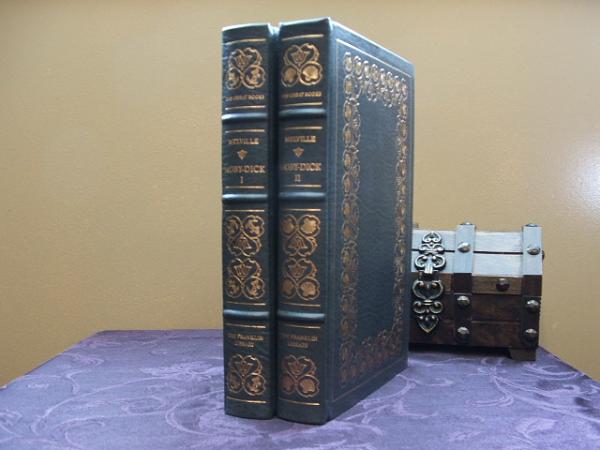Easton Press Herman Melville books
Moby Dick - 100 Greatest Books Ever Written - 1977
Billy Budd and Benito Cereno - 1980
Typee - 1982
Short Stories of Herman Melville - 1996
Franklin Library Herman Melville books
Billy Budd, Sailor and the Piazza Tales - World's Greatest Writers - 1978
Typee - 100 Greatest Masterpieces of American Literature -1979
Moby Dick - Greatest Books of the Western World - 2 Volumes 1980
Billy Budd and the Piazza Tales - 100 Greatest Masterpieces of American Literature - 1982
Moby Dick - 100 Greatest Masterpieces of American Literature - 1984
Moby Dick - World's Best Loved Books - 1984
(This page contains affiliate links for which we may be compensated.)
Author Herman Melville
Herman Melville (1819-1891) was an American author who was born in New York City were he attended public schools. Following his education he was sent on a voyage to England as cabin boy on a ship. He returned to the United States for a short time and then joined a whaling ship for a voyage in the South Seas. His journey on the whaling ship took him to the Marquesas Islands where he was captured and held by natives. After a month of captivity he escaped on a trading ship which took him to Tahiti. He worked in Tahiti and eventually funded his voyage to Honolulu. With little means of support in Honolulu, he joined the United States Navy in 1843. A year later he was discharged from the United States Navy and returned to New York. After a brief stay in New York he relocated to Pittsfield Massachusetts where he befriended now famous American author Nathaniel Hawthorne. His attempt at supporting himself as an author met with little success, and in 1866, Herman Melville began working as his friend Nathaniel Hawthorne in a customs house.
The early books by Herman Melville were romance novels based in the South Seas, and included Typee, Omoo, and Mardi. In his next books Herman Melville fictionalized his own experiences at Sea which include the novels Redburn, His First Voyage, and White Jacket.
Next he wrote his masterpiece Moby Dick which is a brilliant story of struggle between Captain Ahab, Captain of the whaling ship Pequod, and a white whale named Moby Dick. Historically scholars have considered Moby Dick the whale as the primary symbol of the novel, however no one has ever explained with certainty what the whale represents. It is likely that Herman Melville intended for the whale to be the primary symbol due to the title of the novel. While the book was not a huge success at the time of publication, today Moby Dick is considered one of the greatest books in American Literature, and a World classic.
Despite the critical acclaim afforded to Moby-Dick, Melville struggled to replicate its success in his later works. His subsequent novels, including Pierre, Isle of the Cross (1852) and The Confidence-Man (1857), were met with indifference or outright hostility from readers and critics alike. the
next book The Piazza Tales is considered another of Herman Melville's
classics. The Piazza Tales contains a masterful collection of short
stories including The Piazza, Bartleby the Scrivener, Benito Cereno, The
Lightning Rod Man, The Encantadas, or Enchanted Isles, and The Bell
Tower.
In The Confidence-Man: His Masquerade Herman Melville criticizes Ralph Waldo Emerson, other New England writers. Following this book he published a number of poems until writing his final novel Billy Budd. Billy Budd, although shorter, is considered to be nearly as powerful as Moby Dick in many respects, and helped complete the extraordinary career of one of America's greatest authors. Following the death of Herman Melville, his books gained little attention until the 1920's when they saw a surge in popularity that lasts to this day. Outside of his novels Herman Melville wrote numerous poems, essays, and magazine articles which are generally unread by the masses today.
Melville spent the latter part of his life in relative obscurity, working as a customs inspector in New York City to support himself and his family. It was not until the mid-20th century that his work began to receive the recognition it deserved. Today, Herman Melville is celebrated as one of America's greatest literary figures, admired for his bold experimentation with form and style, his profound insight into the human condition, and his enduring contributions to the canon of world literature. He passed away on September 28, 1891, leaving behind a legacy that continues to inspire and captivate readers around the world.
His novel and short stories include:
Typee : A Peep at Polynesian Life - 1846
Omoo : A Narrative of the South Seas - 1847
Mardi : And a Voyage Thither - 1849
Redburn : His First Voyage - 1849
White Jacket, or The World in a Man-of-War - 1850
Moby Dick, or The Whale - 1851
Pierre: or, The Ambiguities - 1852
Isle of the Cross - 1853
Israel Potter: His Fifty Years of Exile - 1856
The Piazza Tales - 1856
The Confidence-Man: His Masquerade - 1857
Billy Budd, Sailor - 1891 (Published Posthumously in 1924)
